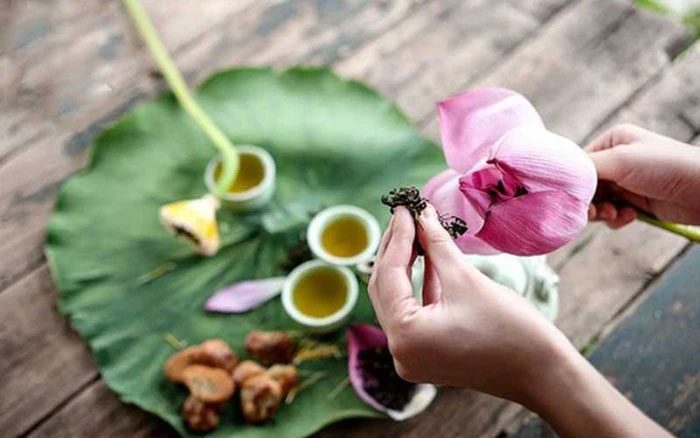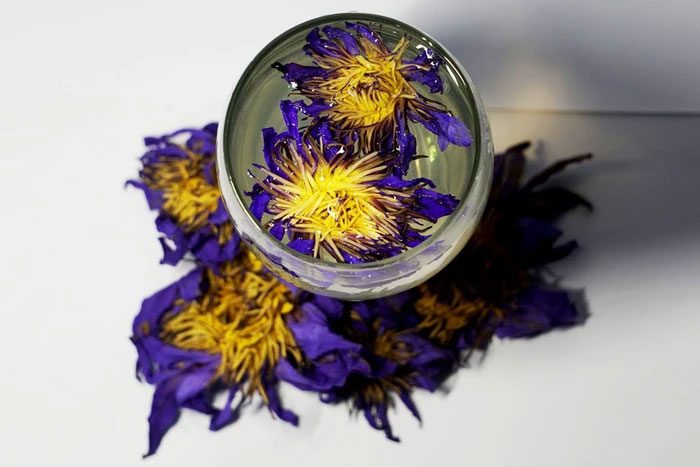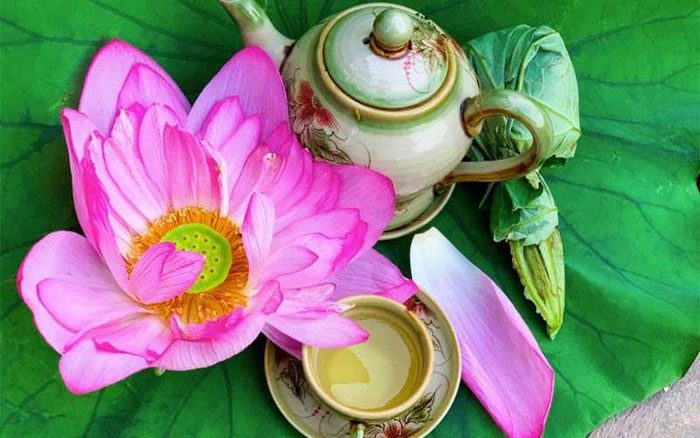Lotus blossoms from May to July are not only used for decoration and culinary purposes but also for making tea that offers numerous health benefits.
The lotus is scientifically known as Nelumbo nucifera. The stems, seeds, leaves, and flowers of the lotus plant have long been utilized in traditional medicine preparations. Lotus flowers are used to support the treatment of diarrhea, infections, coughs, high blood pressure, fevers, and to prevent various diseases.
1. Health Benefits of Lotus Tea
Many studies indicate the potential health benefits of lotus flowers. Tea made from this flower exerts similar effects, specifically:
1.1. Antioxidant Properties
Lotus flowers contain many antioxidants such as kaempferol, catechin, chlorogenic acid, and quercetin. Besides the flowers, the lotus plant also includes various flavonoids and alkaloids that act as antioxidants.
Antioxidants help neutralize reactive molecules known as free radicals. When free radicals accumulate in the body, they can cause oxidative stress, damage cells, and contribute to the development of diseases.
Notably, lotus flowers are also believed to have anti-cancer effects, protect against Alzheimer’s disease, and prevent liver damage. However, more human studies are needed to better understand the potential benefits of lotus in terms of antioxidant effects and disease prevention.

Lotus flowers contain many antioxidants that help prevent diseases caused by free radicals. (Image: ST).
1.2. Anti-Inflammatory Effects
The compounds in lotus flowers also possess anti-inflammatory properties.
Inflammation is one of the primary causes of tissue damage and contributes to diseases such as atherosclerosis, heart disease, cancer, and diabetes.
Studies have shown that some compounds in lotus flowers, such as quercetin and catechin, may help prevent or reduce inflammation pathways.
Another in vitro study using mouse cells found that both extracts from lotus leaves and seeds reduced the expression of inflammatory genes.
While these results suggest that parts of the lotus plant help combat inflammation, further studies on humans are necessary.
1.3. Acts as an Antibacterial Agent
Although not entirely clear, some compounds in lotus flowers show antibacterial properties, including fighting bacteria in the mouth. Studies indicate that lotus leaf extracts can combat bacteria responsible for cavities and gum infections.

Lotus flowers act as antibacterial agents, including against bacteria in the mouth. (Image: ST).
1.4. Helps Lower Blood Sugar
Animal studies have shown that compounds in lotus flowers may help reduce blood sugar levels. High blood sugar often occurs in individuals with diabetes and can lead to complications.
While it remains unclear, it is speculated that the anti-diabetic effects of lotus flower extracts may stem from the antioxidants they contain.
2. How to Brew Lotus Tea
To enjoy a delicious cup of lotus tea, you can follow the instructions below:
- Select fresh lotus flowers that are not damaged, fold the petals, and sun-dry them thoroughly.
- Once the flowers are dried, you can use them to brew tea. Place the flowers in a teapot, pour hot water over them, and steep for about 10 to 15 minutes before enjoying.
Any remaining lotus flowers should be stored in a glass jar in a cool area, such as the refrigerator.
In addition to using lotus flowers, you can also use lotus leaves to make tea. The preparation is similar to lotus flower tea. Besides the benefits of lotus flower tea, lotus leaf tea can help improve sleep, reduce blood fat, enhance metabolism, increase bowel movement, and detoxify the body.

People can use dried lotus flowers to brew tea. (Image: ST).
3. Precautions When Using Lotus Tea
While it offers various health benefits and rarely causes side effects, it is important to keep a few things in mind when using lotus tea:
- Avoid drinking tea on an empty stomach as it may cause digestive discomfort.
- Lotus flowers may cause allergic reactions such as skin itching in some individuals.
- Do not brew tea if the flower buds show signs of mold.
- Pregnant or breastfeeding women should consult a doctor before using lotus flower tea.
- Lotus flowers can lower blood sugar levels. There are concerns that using lotus as a medication may affect blood sugar control during and after surgery. Therefore, it is advised to stop using lotus flowers at least two weeks before a scheduled surgery.
- Using lotus flowers in conjunction with diabetes medication may cause blood sugar levels to drop too low. Thus, it is advisable not to consume lotus tea while on diabetes medication.
- There are some concerns that using lotus flowers with pentobarbital may cause excessive drowsiness. However, there is insufficient evidence to confirm this viewpoint.
4. How Much Lotus Should Be Consumed Daily?
The appropriate dosage of lotus depends on several factors such as age, health status of the user, and other conditions. Currently, there is not enough scientific information to determine the appropriate dosage range for lotus supplementation.
However, it is advisable to use lotus in appropriate amounts and not to abuse it as it may be harmful to health.



















































